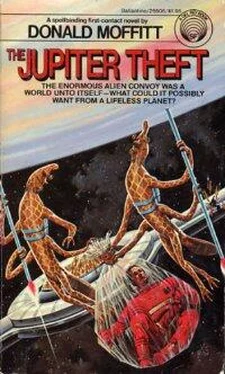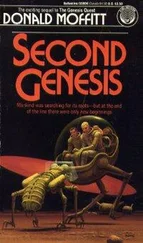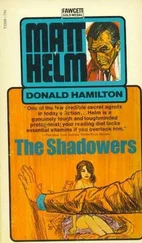Dr. Chu put down the lightpad, took a nervous glance at Captain Hsieh for reassurance, and said: “We can be sure about the figures. You see, after the supernova explosion it would have taken the system another six million years to become an X-ray source. The X-ray stage is brief. It could not last more than fifty thousand years. But we know that Cygnus X-1 is an X-ray source now! ”
“Or has been within the last ten thousand years,” Ruiz said.
“Of course,” Chu said apologetically. “It is ten thousand light-years away.”
“Go on, Dr. Chu,” Ruiz said. “You’re doing fine.”
“When the helium star exploded, its remnant collapsed. It became a black hole. Cygnus X-1, in fact, was the first black hole to be positively identified, back in the twentieth century. Now, the black hole continued to circle its companion—waiting, as Dr. Ruiz might say, for a chance to take back its stolen mass. “It must wait for six million years, till its companion burns up its ill-gotten hydrogen and becomes a blue supergiant. Blue supergiants are almost always associated with such X-ray sources. A blue supergiant some—oh, twenty times larger than the sun will begin to lose mass in the form of a solar wind, at the rate of about a millionth of a solar mass per year. Some of the mass falls into the black hole. It disappears from the universe forever. But during that fall to infinity, the gas accelerates to tremendous speed, and is heated to a temperature of tens of millions of degrees Kelvin. It is this envelope of falling gas that generates X-rays. For a brief period—not more than fifty thousand years—it will shed X-rays burning with the radiance of ten thousand suns.”
Chu stopped and mopped his brow. His eyes roved toward Hsieh, then to the People’s Deputy Commander.
“After that,” Ruiz said, “the newly formed blue supergiant overflows its Roche lobe and pours its mass down the black hole at a rate that extinguishes it as an X-ray source.”
Mike Berry was facing the two astronomers, hands on hips. “So you say our six-legged friends left home six million years ago, before all this happened?”
“There’s no doubt of it,” Ruiz said.
“Then tell me this—if Cygnus X-1 is ten thousand light-years away, and they’ve been traveling at the speed of light, where have they been all this time? ”
Ruiz looked pleased at the question.
“That’s obvious,” he said. “Making stops.”
Mike was a very bright person. He chewed it over a few moments, then said: “Dr. Ruiz. You’ve deduced a hell of a lot about our little buddies from the mass of a star and the mass of a black hole. Now this ought to give us a clue about how long—”
“It does,” Ruiz said.
Boyle got to his feet. “Dr. Ruiz, I think—”
“Let him go on,” Hsieh said. “Our people have a right to know.”
“You’re right,” Boyle said. “Go on, Dr. Ruiz.” He sat down.
Ruiz looked round the crowd. Almost the whole human colony was there now. In the artificial starlight their faces were a pointillist cobble of silver blobs. Here and there a firefly darted as a glowing joint was passed from hand to hand.
“The average distance between stars in our part of the galaxy is about six light-years,” he said. “If the Cygnans traveled a more or less straight line getting here, zigzagging from star to star, they encountered sixteen or seventeen hundred of them. If they stopped to refuel at every star, they would have stayed for an average of three thousand six hundred years each time.” He paused. “If they stopped at, let us say, every tenth star each visit would have lasted some thirty-six thousand years.”
“But why? ” Mike pushed away the joint that someone offered him. “Tod Jameson says the Cygnans aren’t interested in the systems they visit! They never make planetfall. Even granting that they’d have to do some robot mining from time to time, refurbish their ships, they ought to be able to travel more than six light-years on a gas giant! Once they got coasting at close to light-speed, they ought to be able to reach another galaxy, for God’s sake, without refueling—even with the inefficiency you mentioned before. Just shut off their robot siphon and let it careen away into infinity. Make another one when they want to brake. Why waste two years out of six accelerating and braking if they’re going somewhere—”
“They’re not going anywhere,” Ruiz said.
“What do you mean?”
“They’ve forgotten. After six million years, they’ve forgotten. Their pattern of travel—hopping from star to star—made sense when they started out. They were looking for a new home. They didn’t find one they liked soon enough. So after a few thousand years, I imagine, they got used to living in ships. They were safe in the ships. A real world might not be safe. But their pattern of travel persisted. Degenerate societies cling to old habits, just like degenerate organisms.”
“Okay,” Mike said. “Maybe you’re right. But I’m still asking why they hang around a system they’re not interested in for three thousand years.”
Ruiz looked around at the dappled faces. He sighed. He turned back to Mike. “Maybe they’re getting up their courage for the next jump.”
There was a growing murmur in the crowd. Ruiz held up a hand.
“We don’t know what it’s like to travel between the stars,” he said. “All that empty space must be a terrifying thing. Our own mariners in the ancient world and Middle Ages never braved the open sea, even when they knew their destination. They island-hopped, stayed within sight of land, traveled coastwise from point to point.”
“Scared? After six million years in space?” Mike said. “Minus—how much time for time dilation? You figure it out, but even if they’d come nonstop, it couldn’t have saved them more than ten thousand years.”
“That’s the point exactly,” Ruiz said. “If they’d covered the ten thousand light-years at—let’s say—ninety-eight percent of the speed of light, then time is slowed … hmm … fivefold, and they have to spend two thousand years in the empty space between the stars. Even at ninety-nine point ninety-nine percent of light-speed, the jump takes them a hundred years. Lifetimes for millions of Cygnans who never get to come in out of the dark! But if they star-hop, then with a year to boost, a year to brake, hmm, a few weeks or months to cover the intervening light-years, then they never have to spend more than three years adrift. Then they spend the next three thousand years or more getting brave enough to do it again.”
A tremulous voice came out of the silver dark: Liz Becqued “Dr. Ruiz, are you saying that we’re—that the Cygnans are going to remain here, in this solar system, that long?”
Ruiz shrugged. “There’s no reason to assume anything different.”
Maggie turned quickly to Jameson. “I thought you said—”
“ Shhh— the old fox knows what he’s doing.”
“But—”
Jameson leaned to whisper in her ear. “Something’s up with the Chinese. I don’t think Ruiz believes they’ll do anything precipitous, but he’s taking the pressure off anyway. This buys time for the Cygnans.”
Maggie looked around, made sure no one was listening. Everybody was intent on Ruiz. “But what he said about their stopping and staying at almost every star … that’s true?”
“It has to be,” he said with an uneasy glance around. “Either that or they parked somewhere for the whole six million years.”
Maggie wouldn’t let go. She seemed agitated. She tugged at his hand. “But you said they’re leaving in a few days. Why is this solar system any different?”
Читать дальше












